Tulane School of Medicine’s diverse mission including education, research and patient care provides ample opportunities for translational cutting edge research. Biomedical Sciences students have an opportunity to select research mentors from over 100 faculty members funded by nearly 2,000 active grants. Faculty are also members of numerous Tulane centers including the Tulane Cancer Center, Hayward Genetics Center, Hypertension and Renal Center of Excellence, Tulane Brain Institute, Tulane Center for Aging, Center for Stem Cell Research and Regenerative Medicine and the Tulane National Primate Research Center.
|
|
|
Innovative Education |
|
|
|
The Louisiana Board of Regents has awarded a five-year Comprehensive Enhancement Grant for career development in the Biomedical Sciences Graduate Program. Dr. Diane Blake, BMS program Co-Director is the PI of the project, which includes employment-guided curriculum development, aptitude testing, skills assessment, skills enhancement and networking. The goal is to offer support, structure and community as students take the leap into career exploration. Successful program elements will be transferred to other STEM graduate programs at Tulane. |
|
|
|
New blood test can help doctors diagnose tuberculosis and monitor treatment (June 1, 2022) |
|
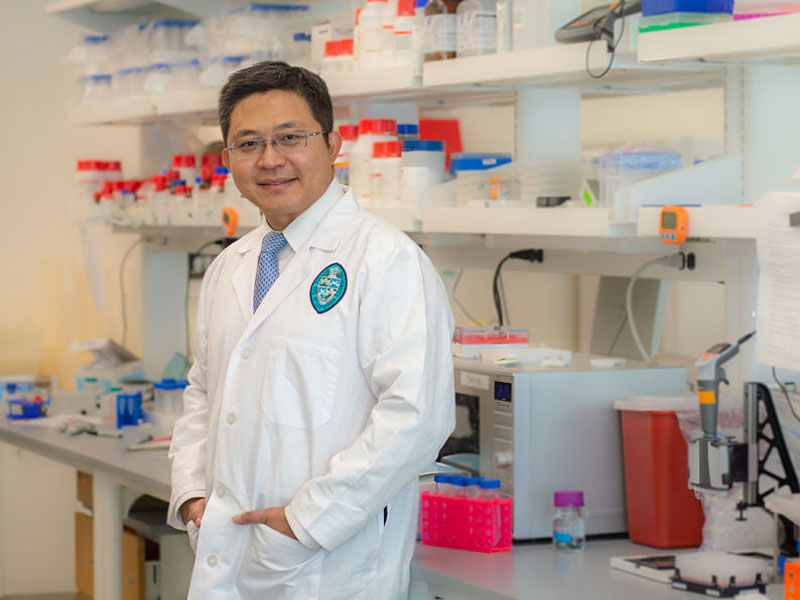
Tony Hu, PhD |
Researchers at Tulane University School of Medicine have developed a new highly sensitive blood test for tuberculosis (TB) that screens for DNA fragments of the Mycobacterium tuberculosis bacteria that causes the deadly disease. Read More. |
|
|
|
Researcher awarded $2 million grant to study biology of “jumping genes” (May 9, 2022) |
|

Jeffrey Han, PhD |
Transposons – also known as “jumping genes” – are pieces of movable DNA that can jump around in the genome. Through a cut-and-paste or copy-and-paste mechanism, they can move copies of themselves to a different chromosome or to a different area of the same chromosome. This process – called transposition – can result in mutations and DNA damage. Read More. |
|
|
|
Tulane researchers receive American Heart Association grant to study COVID’s vascular effects (April 25, 2022) |
|

Xuebin Qin, PhD |
The American Heart Association has awarded Tulane University researchers $940,000 to study how COVID-19 spurs vascular inflammation that may increase risks for blood clots and lingering symptoms of long COVID. Read More. |
|
|
|
Tulane and New Orleans VA researcher receives funding for prostate cancer breakthrough (April 8, 2022) |
|

Franck Mauvais-Jarvis, MD, PhD |
Patients battling prostate cancer may one day be less likely to face life-threatening side effects, thanks to research being conducted at the New Orleans Veterans Medical Center and Tulane University School of Medicine. Read More. |
|
|
|
Tulane study shows COVID-19’s lingering impacts on the brain (April 1, 2022) |
|
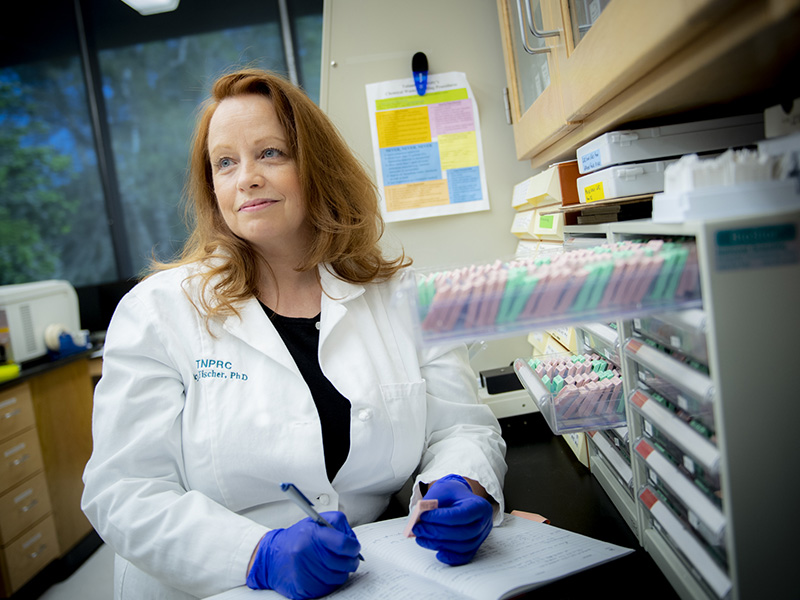
Tracy Fischer, PhD |
COVID-19 patients commonly report having headaches, confusion and other neurological symptoms, but doctors don’t fully understand how the disease targets the brain during infection. Read More. |
|
|
|
Tulane awarded $14 million NIH grant to study why heart disease, diabetes may blunt brain benefits of estrogen therapy (March 4, 2022) |
|
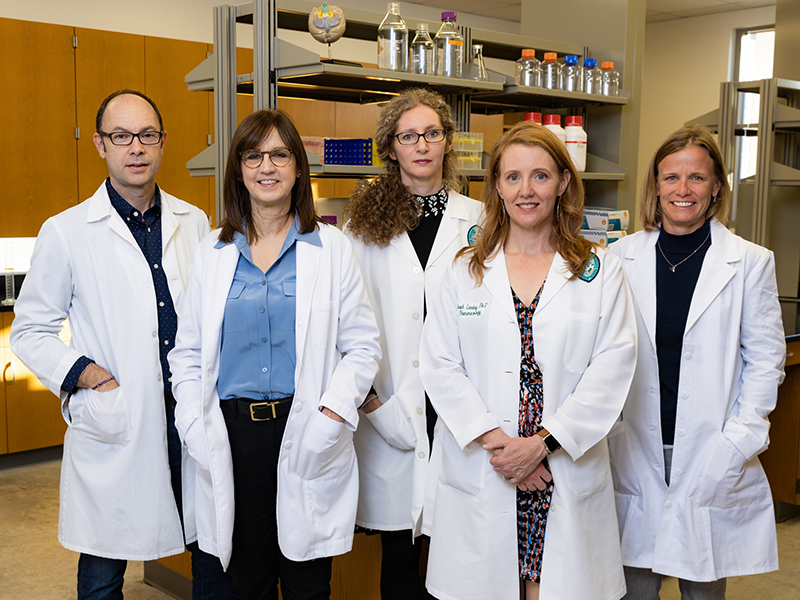
(L to R) Ricardo Mostany, PhD, Jill Daniel, PhD, Andrea Zsombok, PhD, Sarah Lindsey, PhD, and Laura Schrader, PhD |
Decades of lab research shows that estrogen can protect women against age-related cognitive decline and may even delay or decrease incidence of Alzheimer’s disease and other forms of dementia. But these laboratory findings haven’t always translated to real-world results for women who take estrogen therapy after menopause. Read More. |
|
|
|
Researcher receives $1.7 million grant to study faulty DNA repair and cancer risk (October 27, 2021) |
|

James Jackson, PhD |
DNA damage from environmental toxins can result in mutations and disease if not repaired rapidly and accurately. Read More. |
|
|
|
Tulane researchers develop inhaled vaccine against bacterial pneumonia (September 10, 2021) |
|

Jay Kolls, MD |
Researchers at Tulane University School of Medicine have developed an inhaled vaccine against Klebsiella pneumoniae, a bacterium that can cause pneumonia in hospital settings. The vaccine was able to protect mice against several strains of the bacteria, Read More. |
|
|
|
Tulane launches ‘biobank’ for researchers studying causes of long COVID-19 (July 28, 2021) |
|
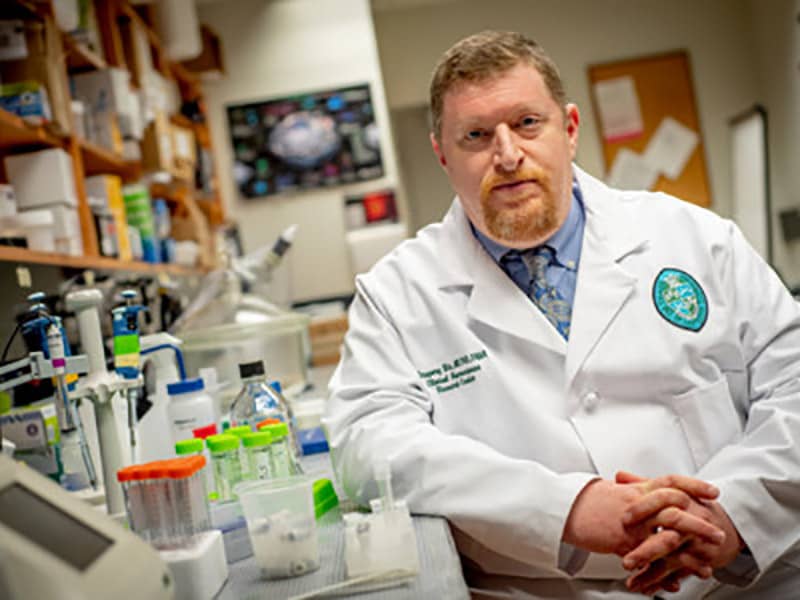
Gregory Bix, PhD |
For most people, a mild case of COVID-19 lasts less than two weeks. But some COVID-19 “long-haulers” face a range of symptoms — dizziness, brain fog, headaches and loss of their sense of smell — that can linger for months. Researchers can’t explain exactly why. Read More |
|
|
|
Virus hunter: 'We have to double down' to fight COVID-19 variants (February 4, 2021) |
|
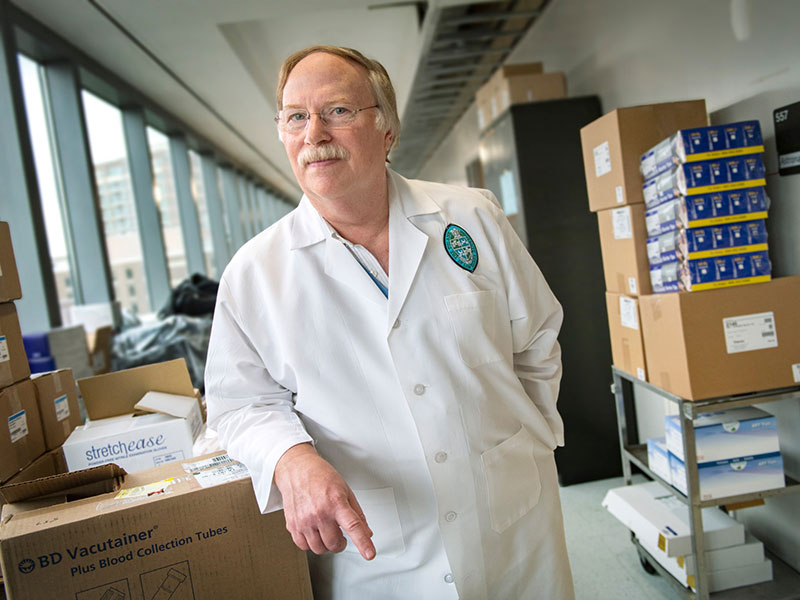
Robert F. Garry, PhD |
The SARS-CoV-2 virus is rapidly evolving as COVID-19 spreads across the globe. Tulane Microbiology Professor Robert Garry, PhD, is part of a national team of leading virologists who are sequencing coronavirus samples to monitor mutations. Read More. |
|
|
|
Tony Hu, Weatherhead Presidential Chair of Biotechnology Innovation at Tulane University, says the research team's development addresses the need for a rapid ultra-sensitive COVID-19 test (December 14, 2020) |
|

Tony Hu, PhD |
Researchers from Tulane University have developed a 15-minute COVID-19 test that is read by a smartphone to address the need to expand testing capacity in community-based settings. This test uses the same CRISPR-based approach that the researchers have submitted to the Food and Drug Administration for Emergency Use Authorization. Read More. |
|
|
|
Tulane researcher uses gene editing technology in promising step toward eliminating HIV (November 30, 2020) |
|

Andrew MacLean, PhD |
Co-corresponding author Andrew MacLean, PhD, associate professor of microbiology and immunology at Tulane National Primate Research Center, is hopeful that the treatment strategy will translate to people living with HIV. Read More. |
|
|
|
Tulane Researcher Awarded $3 Million to Address Aging and Disease Impacts on the Brain (October 3, 2020) |
|
 |
New research projects underway at Tulane University School of Medicine aim to understand why aging and conditions such as type 2 diabetes impact the brain, and how to slow that process. Dr. David Busija, Regents Professor and Chair of Pharmacology, has been awarded more than $3 million to lead the research team in these areas. Read More |
|
Dr. Busija is Regents Professor and chairman of the Department of Pharmacology at Tulane University School of Medicine. |
|
|
|
|
Tulane Researchers Awarded Fast Grant for Second-Generation COVID-19 Vaccine (Aug 27, 2020) |
|
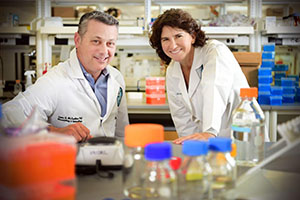
Immunologist James McLachlan, PhD and microbiologist Lisa Morici, PhD, were awarded a Fast Grant to test whether adjuvants can make vaccines more effective and longer lasting |
As pharmaceutical firms race to bring the first COVID-19 vaccines to market, scientists are already working on version 2.0. Two Tulane University researchers were awarded a $150,000 Fast Grant for a project to make next-generation COVID-19 vaccines more effective. Microbiologist Lisa Morici, PhD and immunologist James McLachlan, PhD, will test whether they can elicit a better immune response in tissues most vulnerable to SARS-COV-2 infection - the lungs and gut - by adding two bacteria-based adjuvants to COVID-19 vaccines in development. Adjuvants are ingredients used in vaccines to trigger an immune response. Read More. |
|
|
|
CDC awards grant to Tulane researchers studying COVID-19 (August 5, 2020) |
|
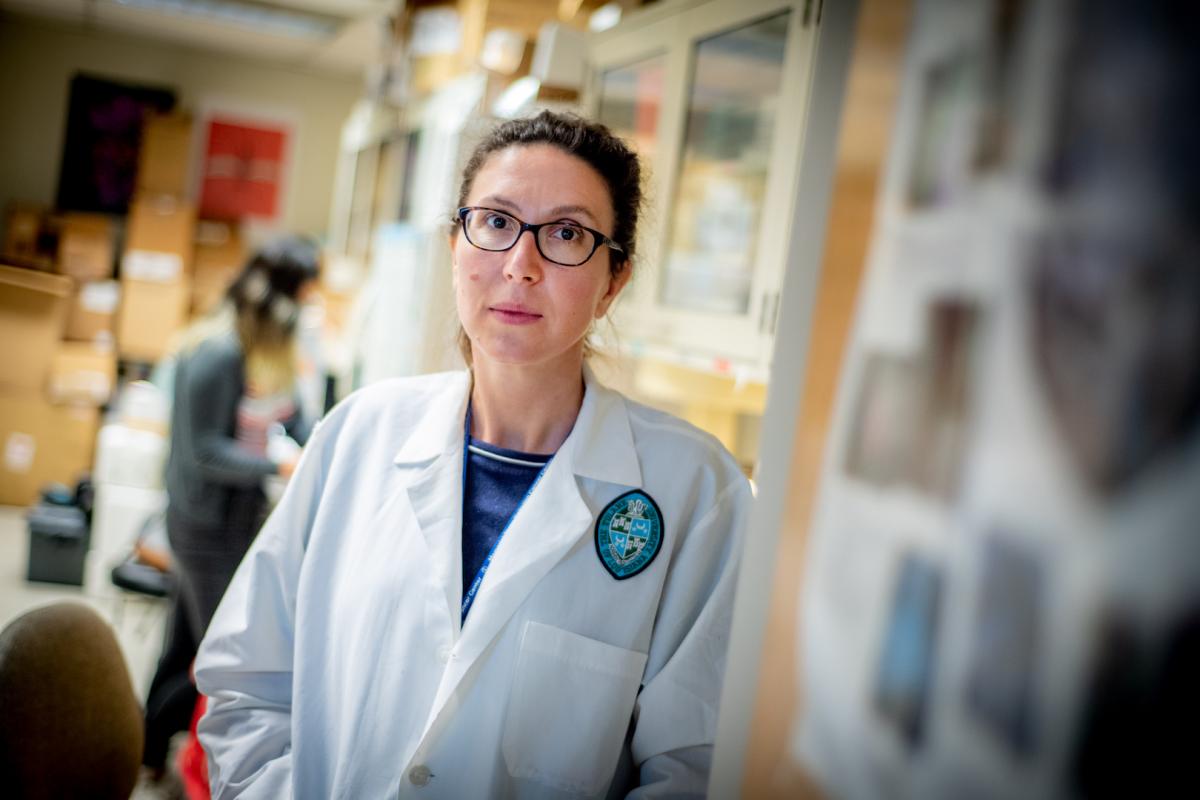
Dr. Dahlene Fusco is an assistant professor of medicine at Tulane University School of Medicine |
SARS-CoV-2 can affect people in a number of different ways, from an absence of symptoms to major complications, even death. The Centers for Disease Control recently awarded $700,000 to a Tulane University team of researchers who are studying how the virus works and where and when it is shed. What they find could help explain why COVID-19 is causing higher death rates among Black and Hispanic residents of New Orleans. Read More. |
|
|
|
Tulane Researchers Develop Synthetic Antibody Against COVID-19 (June 22, 2020) |
|
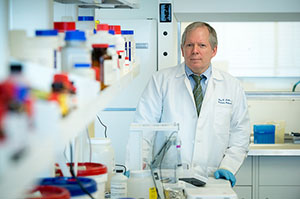 |
Jay Kolls, MD, the John W. Deming Endowed Chair in Internal Medicine at Tulane, along with other researchers at the School of Medicine, designed a synthetic protein that acts as a decoy to intercept and neutralize COVID-19 before it can latch onto an enzyme, ACE2, and infect healthy cells. Read More |
|
Jay Kolls, MD |
|
|
|
|
From Proposals to Funded Research in 48 hours: Tulane Scientists Receive Fast Grants (May 8, 2020) |
|

Mairi Noverr of Tulane University School of Medicine along with Monica Vaccari and Tracy fisher of Tulane National Primate Research Center --Photos by Sally Asher |
Three Tulane University researchers are the recipients of new Fast Grants, awards designed to quickly fund COVID-19 related projects. Mairi Noverr, Monica Vaccari and Tracy Fisher received a total of $350,000 for their proposals, all of which progressed from mere proposals to fully-funded projects in just 48 hours. ( Read More. |
|
|
|
Tulane University Awarded $10.3 Million to Test Therapeutics, Vaccines for Novel Coronavirus (April 6, 2020) |
|
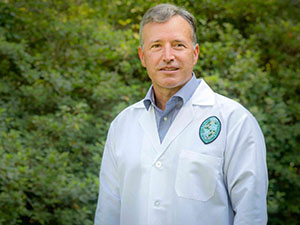
Chad Roy (pictured), director of infectious disease aerobiology at Tulane National Primate Research Center. --Photo by Sally Asher. |
The National Institutes of Health, National Institute of Allergy and Infectious Diseases (NIH/NIAID) has awarded Tulane National Primate Research Center a contract of up to $10.3 million to evaluate the nation's most promising vaccines and treatments to combat coronavirus disease 2019 (COVID-19). Dr. Roy will lead the project to evaluate the nation's most promising vaccines and treatments against COVID-19. COVID-19, or the novel coronavirus, is an emerging infectious disease that has infected over 1.17 million people and claimed more than 64,000 lives in a global pandemic. No vaccines or treatments currently exist to treat the highly-contagious disease. Read More. |
|
|
|
Tulane Researchers Discover Possible Pathways to Treating Drug-Resistant Infections (March 30, 2020) |
|
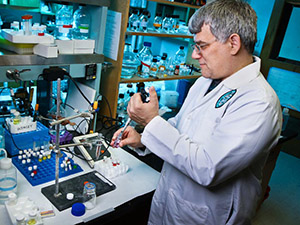 |
Drug-resistant bacterial infections are on the rise, while the development of new antibiotics to fight these infections has slowed in recent decades. Mathematical models predict more than 10 million people will die annually from drug-resistant bacterial infections by 2050 if the current rates of increase continue. Read More. |
|
William Wimley holds the George A. Adrouny, Ph.D. Professorship in Biochemistry in the Department of Biochemistry and Molecular Biology at Tulane University School of Medicine. |
|
|
|
|
Primate Center on the Frontlines of COVID-19 Research (March 25, 2020) |
|
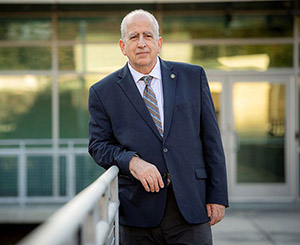 |
Researchers at the Tulane National Primate Research Center (TNPRC) are working to discover safe and effective COVID-19 vaccines and treatments. Earlier this year, TNPRC had the distinction of becoming one of the first research facilities in the country to obtain approval from the Centers for Disease Control to receive live samples of the novel coronavirus. Read More. |
|
Center Director Jay Rappaport, PhD, said Tulane National Primate Research Center is the only National Primate Research Center with a Regional Biocontainment Laboratory that is capable of the biocontainment required to study an emerging infectious disease like COVID-19. --Photo by Paula Burch-Celentano |
|

